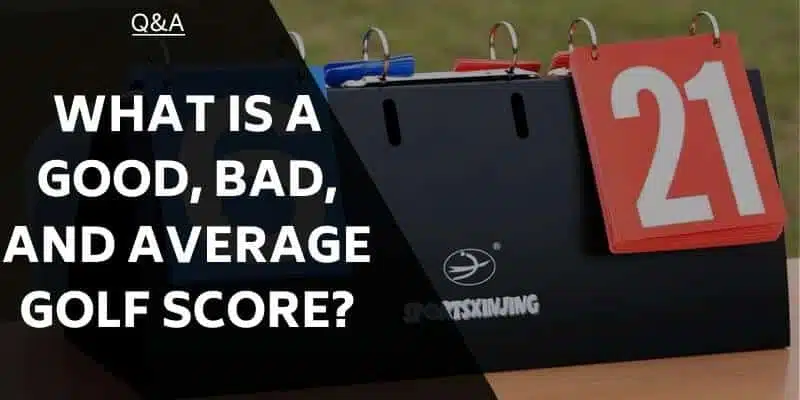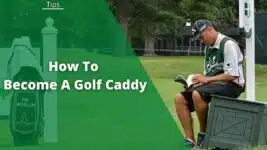Next to the dreaded shank, there may not be another golf shot that is more embarrassing (or cringe-worthy) than the double cross.
What exactly is the double cross in golf? The Double Cross is a shot that flies in precisely the opposite shape of what a golfer intended. It happens more often than most would like to admit and usually at the most inopportune time. An example of the painful double cross can often look like this: You aim left to hit a fade and pull hook it off the map.
The double cross is awful to witness and even worse when it happens to you. But you don’t have to accept that you will hit them.
Read on to learn:
- What is the Double Cross?
- 5 reasons why you hit a Double Cross
- How you can avoid the Double Cross
What is Double Cross in Golf?
A Double Cross is a shot that does precisely the opposite of what you intend for your ball to do. It tends to happen at the worst possible times too. The following scenario is something that plays out more than many golfers care to admit.
Here’s a typical story of the Double Cross:
You smoke the perfect drive, long and straight on a par five. In doing so, you have a very legitimate chance of going for the green in two shots, something you have never done before.
You are the exact yardage out from the green for a perfect four-hybrid shot. The shot sets up so well for your baby fade, which you almost always pull off with your four-hybrid. It’s go time, baby!
That water all down the left side of the hole is not at all a worry. Your patented fade is money, and you haven’t hooked a shot in years, so that is not even a worry.
You look down your target line from behind the ball, then walk up and address the ball. You can hardly contain your excitement because you know you will have a tap in Eagle putt. That five-hole carry-over skin is already yours!
You start your backswing, transition down from the top, and…and…
You proceed to aggressively come over the top, swinging out of your shoes, shut the clubface abruptly, and hook it so bad that you go left of that water down the left side and 30 yards out of bounds.
Yikes!
We’ve all been there, and it is a gutting experience. That colorful description of this ugly shot, known as the Double Cross, tells us a little about one reason why these shots may happen.
Many golfers have this scenario play out in real life, and the reason very often is a rush of adrenaline during a shot that is something we know we can indeed pull off.
More from me on Golf Span: How to Hit a Golf Ball Straight: 10 Tips
5 Reasons Why You Hit The Double Cross in Golf
The following are the five most common reasons I see players hitting the double cross in golf. The first key to preventing this is identifying why you might be doing it.
1. Not Paying Attention to Pre-Swing Fundamentals
The pre-swing fundamentals in golf lay the foundation for everything. You must have a solid understanding and application of these key pre-swing concepts to hit the ball constantly.
There are things that I call “match-ups” in golf. In your grip, the V’s formed by your pointer finger and thumb, on both hands, must “match up” with each other. The face of the club at impact and the path you are swinging on during your downswing need to “match up” to create the shot you want to hit.
Golfers that hit the double cross very often have miss-matches happing somewhere. In the case of the double cross, your body alignment is probably off in relation to where you want your ball to fly. When this happens, we tend to try and fix the mistake with our hands at the last minute by having them close or open the clubface pre-impact.
2. Poor Body Rotation
A properly struck golf ball is the result of several things happening simultaneously. One of those things is having a proper downswing sequence. In a deeper dive of that thought, how we rotate our body, both lower and upper, the degree at which we do it, the speed at which it’s done, and doing so in the proper order, is one necessary element in being able to strike the ball well at impact.
Golfers that do not rotate their body correctly on the downswing may once again try to “save’ the shot with their hands at impact. Because the hands move much faster than the body, it is very difficult to time this correctly, no matter how skilled you may be.
This could be a reason for a ball sailing in the opposite direction of what you had intended.
3. Losing Sight of Your Clubface at Impact
Your clubface is king at impact. At the moment of impact, how your face comes into the ball, in relation to your swing path and target line, will determine where the ball goes. Having poor clubface control will give you poor control of the shots you hit.
4. Poor Swing Path In Relation to Your Alignment
I want to return to my first point for a second and pull another element out of that thought. One critical pre-swing element is alignment. Good alignment means correctly aligning your body with your target line.
For a straight shot, you want your body to be parallel left (for right-handed players) to your target line. To hit different shot shapes, you may want to close or open your body lines concerning your target line to move the ball one way or the other. Doing this helps adjust your swing path for the shot shape you are attempting to hit. Doing this will, however, not guarantee that you WILL swing on that desired swing path…it only helps make it possible.
It is common for golfers to need help with how their body is lined up to the target. Sometimes it is off quite substantially to what they think it is. When this happens, and you swing the club on a path that fights against your body lines, you will have problems.
5. Your Mind Isn’t Calm
The mind plays a massive role in the outcome we get from each and every shot. The scenario I drew up previously, in my explanation of what a double cross is, gives us a glimpse into how the mind can affect an outcome in golf.
If a golfer is overly excited before a shot or even not mentally committed to the task, wayward shots, including double crosses, can be expected.
Check this out: How To Hit A Driver Consistently – The Ultimate Goal
How You Can Avoid The Double Cross in Golf
I suggest using the following checklist to avoid hitting the double cross.
- Pay attention to your pre-swing fundamentals– Including a good grip, good posture, and accurate alignment.
- Make sure to rotate your body correctly– This may take practice on the range, but ensuring you both understand and can implement the proper downswing sequence, including how the lower and upper body is supposed to move, is critical.
- Learn to have better clubface control– A great way to be more aware of your clubface alignment is by paying attention to your lead wrist. The position of your lead wrist is the eyes to what your clubface is doing throughout the swing, whether it is open, square, or closed.
- Have a better body alignment and swing path relationship– Working on and being very in tune with your alignment will significantly help you. The same can be said for your swing path. Get used to recording your swing and watching a playback to check these two aspects of your swing. Sharing recorded swings with a coach is also a great way to improve.
- Your state of mind– Don’t get overly excited when “green light” situations come up on the golf course. Keep your composure and go through your regular routine on each and every shot.
Look at this great article: How To Hit a Draw in Golf: The Complete Guide
Final Thoughts
To recap, a Double Cross is a shot that does precisely the opposite of what you intended for your ball to do.
The Double Cross is an awful shot to have pop up during a round. That is especially true when you are playing well, and a great opportunity arises to do something extraordinary, such as drive a short part four, or get home in two on a par five.
This article will serve you well in understanding what the double cross is and how to avoid it from happening the next time you are out on the links.
Brendon is Class A PGA Professional and founded Little Linksters, LLC, and its nonprofit arm, the Little Linksters Association for Junior Golf Development. He won 25+ prestigious industry honors, including the 2017 PGA National Youth Player Development Award. He graduated from the PGA of America Management Program and has a handicap index of 7.8.
He has played golf for over 40 years and currently plays twice a month at the Eagle Dunes Golf Club near Sorrento, Florida. He loves Srixon clubs and plays a ZX5 driver with Z 585 irons. He's written over 60 articles on GolfSpan and specializes in sharing tips to improve your golf game. You can connect with Brendon at LinkedIn, X, IG, FB, his website, or BrendonElliott@pga.com.
- Best score: 69
- Favorite driver: Srixon ZX5
- Favorite ball: Srixon Z Star
- Favorite food at the turn: Turkey and cheese on white








